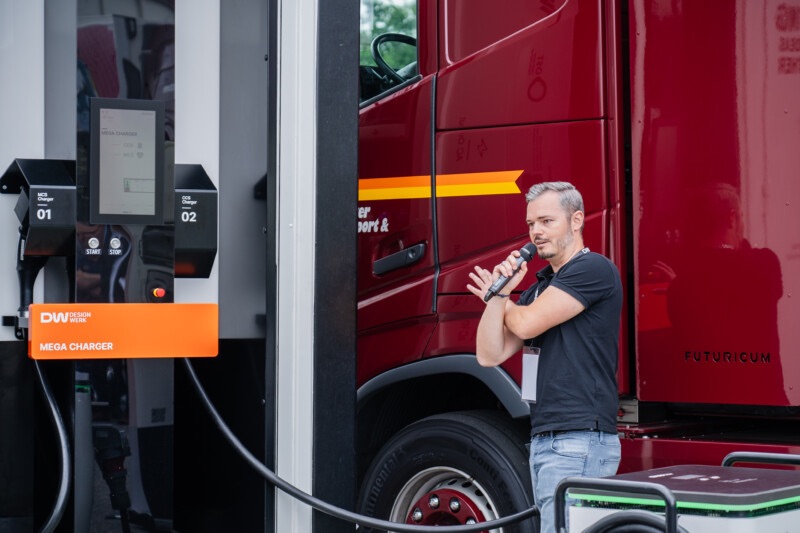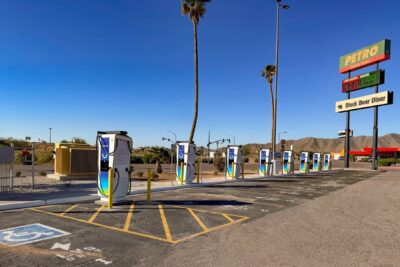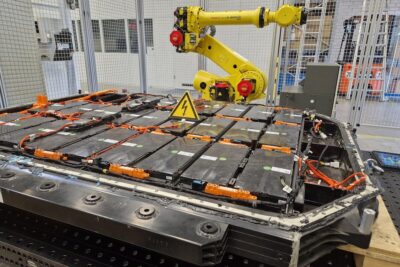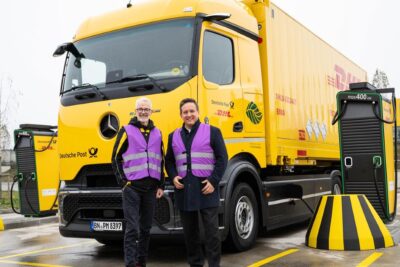Depot charging for electric trucks: Galliker tests Mega Charger from Designwerk
“The new charging systems will be used to make electric commercial vehicles suitable for long journeys without overloading the power grid,” says Designwerk. The system ensures that the electricity grid is not overloaded by charging peaks during the charging process and will also help to balance out the fluctuating energy supply from renewable sources. The individual charging power and battery capacity can be adapted to the customer’s needs.
The technical data published by Designwerk for the “Stationary Battery Backed Mega Charger (SBC)” currently includes the aforementioned 420 kW charging power per charging point (i.e. 840 kW total power) and a battery capacity of up to 1 MWh, with which the lithium-ion batteries store energy for the chargers. The dimensions of the container housing the technology are 8.6 x 2.55 x 3 metres.
Designwerk announced at the end of 2023 that it wants to commercialise its battery-buffered charging system for commercial vehicles. The two CCS charging points, each with 420 kilowatts of power, are just the beginning.
The technology behind the charging container originates from an ongoing demonstration project called ‘Megawatt battery charging system for heavy commercial vehicles,’ which started at the beginning of 2022 and which Designwerk reported on a year and a half ago. The project partners are the Swiss Federal Office of Energy, the Bern University of Applied Sciences, the University of Applied Sciences of Eastern Switzerland and other industry players.
However, the demonstration project involves even higher charging capacities. The initiators aim to build and test a battery-supported charging station with a capacity of 1.05 megawatts per charging point. The energy content of the batteries will be 2 MWh, and the container will weigh 25 tonnes. The unit will be connected to the power grid via CEE 125 and that the MCS output can deliver up to 2,100 kW of charging power (up to 3,000 amps at 500 to 900 volts). A CCS plug is also installed. The overall efficiency from the grid to the buffer battery and then to the vehicle will be around 90 per cent.
Designwerk says the device can “serve as an infrastructural basis for the use of the international charging standard Megawatt Charging System (MCS) […] As soon as standardisation is complete, MCS charging ports will be available for initial equipment and retrofitting.”
After around two years of development, the charging station is put into operation for the first time at pilot customer Galliker’s headquarters in Altishofen, Switzerland. According to the partners, the integration of the charging station at the Galliker site network will maximise the latter’s consumption of solar power. The self-consumption connection creates the necessary prerequisites. It couples the solar production of several properties, while an energy management system ensures load disconnection, load shifting and the control of storage systems. The solution will demonstrate how renewable energy and charging technologies can be combined to shape the future of transport logistics, according to the company.
designwerk.com, linkedin.com (both in German)





0 Comments